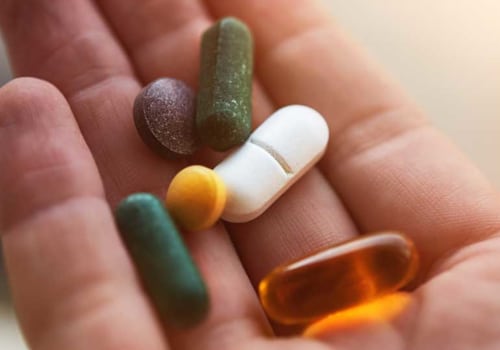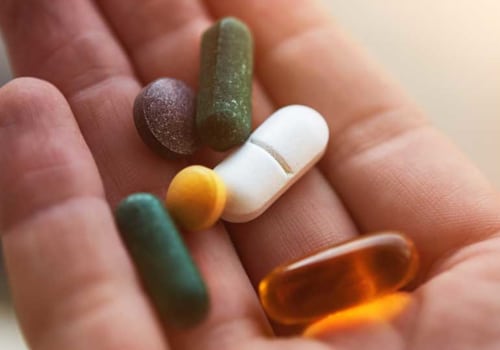Does it help you lose weight? Natural Medicines, an independent group that looks at supplement research, says there is not enough reliable evidence to qualify it. The National Center for Complementary and Integrative Health states that chitosan has not been shown to be effective in losing weight. Chitosan usually does not cause side effects, but some people have an upset stomach or constipation. If you are allergic to shellfish, you should not take chitosan, because it is made from shellfish.
Natural Medicines says there isn't enough evidence to assess how well glucomannan works for weight loss. Glucomannan can also make it difficult for the body to absorb medicines. Therefore, take your medicine 1 hour before or 4 hours after using glucomannan. When you scan supplement shelves at your local pharmacy, you may see promoted weight loss as a benefit of many products.
For example, some people claim that vitamin B12, calcium, omega-3 fatty acids, and green tea supplements can help you lose weight. As weight decreases, strength typically increases. Weight loss is a combination of diet and exercise. The less body mass a person needs to move, the less strain the muscles and bones will suffer.
Vitamins alone will not help much to promote weight loss. The key to losing weight is lifestyle changes. A healthy diet and exercise will contribute much more to long-term weight loss than vitamins alone. Vitamins are intended to support weight loss, not the only cause.
Vitamin B, D, iron and magnesium are 4 popular supplements for weight loss. Talk to a pharmacist to learn more about vitamins you can try. The various B vitamins (and there are many of them) are said to help stimulate your metabolism and therefore could help you lose weight. In fact, some weight loss clinics apparently offer injections of B-12 to help you lose weight, speeding up your energy and metabolism, but according to the Mayo Clinic, unless you have a real B-12 deficiency, you're unlikely to get an energy infusion from these injections.
While no vitamin can suddenly induce weight loss, getting the right amounts of vital nutrients from a balanced diet supports your metabolism, according to the U.S. UU. This, along with reduced portion calorie reduction and regular exercise, can, in turn, help you on your weight loss journey. Because B vitamins are water-soluble, your body cannot store them in excess and instead eliminate them in the urine, according to Nutrients research.
As a result, it is important to get enough vitamin, usually 1.3 milligrams of B6 and 2.4 milligrams of B12 per day for adults, according to the Dietary Guidelines for Americans. Vitamin D is an essential nutrient that helps keep bones strong and supports immune system, muscle and brain cell function, according to the Mayo Clinic. But the researchers also pointed out that the relationship between vitamin D and factors such as blood pressure and glycemic indices is unclear, so more studies are still needed to better understand the relationship between nutrients and weight loss. In any case, vitamin D remains an important part of a balanced diet.
According to the Dietary Guidelines for Americans, people 2 years and older should aim for 600 international units (IU) per day. And when it comes to an upper limit, it is generally safer for adults to limit the daily dose to 4,000 IU, according to the ODS. Spending time in the sun (with sunscreen, of course) can also help improve your vitamin D levels, according to the Mayo Clinic. Will vitamin D3 help you lose weight? While research suggests that vitamin D can help with weight loss, what about vitamin D3 specifically? Vitamin D3 is one of the main forms of nutrients that our body can absorb and is often found in foods rich in vitamin D, according to ODS.
Consequently, eating enough vitamin D3 can benefit weight loss in the manner described above. Vitamin D also helps the body absorb calcium, a mineral that promotes bone strength and supports heart, muscle and nerve function, according to the Mayo Clinic. However, as always, it is best to get the calcium you need through your diet before resorting to pills, according to the Dietary Guidelines for Americans, 1,000 milligrams per day (or 1,200 milligrams, if you are an AFAB person over 5 years old, to be exact). Talk to your doctor about whether you should take a calcium or other supplement, as the FDA does not require that these products be proven safe or effective before they are sold, so there is no guarantee that any pill you take will be safe, contain the ingredients you say they are, or produce the effects they claim.
Vitamin C is another vitamin that can help you lose weight. It is an antioxidant that helps the body produce more blood vessels, cartilage, muscle and bone collagen and protects cells from damage, according to the Mayo Clinic. The recommended maximum vitamin C limit per day is 2000 milligrams, according to the Mayo Clinic. Taking more than that amount can cause symptoms such as diarrhea, nausea, and vomiting.
Magnesium is a mineral that plays a role in energy production, supports muscle and nerve function, regulates blood pressure and helps control blood sugar levels, according to the ODS. Iron is another important mineral that can help you lose weight, albeit indirectly. Iron helps deliver oxygen to muscles, which helps them function at their best, according to the ODS. It also supports muscle growth and healthy connective tissue.
On the other hand, lack of iron can mean low energy and weakness, according to the Mayo Clinic. And it can be difficult to maintain weight loss support habits, such as regular exercise, without that fuel for your muscles. Omega-3 fatty acids have anti-inflammatory properties and may reduce the risk of developing heart disease, Gans says, but “there is little conclusive scientific evidence that they support weight loss. So while vitamin D+ calcium isn't a magic formula for weight loss, at least according to this study, it might be healthy to make sure your diet includes enough of those nutrients or to talk to your doctor about taking supplements, if you're interested in that route.
People should check their vitamin D levels annually and talk to their doctor about supplements if their levels remain low. I do not doubt that there is any placebo-like effect with the commitment required to maintain regular injections, but there is no biological basis for this to work for weight loss. Vitamin and mineral supplements can help you get the energy needed to manage stress, maintain a positive mood, and reduce fatigue. She recommends a B-complex supplement (containing 8 B vitamins) to help your body metabolize stored carbohydrates and fat for fuel, aiding in weight loss and increasing metabolism.
That research determined that the effectiveness of dietary supplements for weight loss is not yet conclusive and the cost of these products can be considerable. However, they will help ensure proper nutrition and correct deficiencies if they exist, which can help prevent involuntary weight gain and maintain a healthy metabolism. Although magnesium is not directly related to weight loss, magnesium plays a role in the body's stress response and also contributes to healthy sleep, says Palinski-Wade. This is a detailed, evidence-based review of the 12 most popular weight loss pills and supplements on the market today.
While calcium supplements are available, it is best for people to get enough calcium from food sources first. The safest way to consume more metabolism-boosting vitamins and minerals is to eat a healthy, balanced diet that is varied and nutritious. Anxiety has been linked to weight gain because the stress hormone cortisol, which is released when you are tense, increases insulin levels, causing a drop in blood sugar that causes cravings for carbohydrates and junk food. According to Palinski-Wade, some research suggests that adequate intake of vitamin C can slow age-related loss of lean body mass and at the same time help the body oxidize fat more effectively.
However, if you suspect that you may be deficient in certain nutrients or that you have trouble getting enough of a particular vitamin, ask your doctor if supplements might be right for you. Most Americans don't get enough fiber in the foods they eat, so it's important to make sure you prioritize fruits and vegetables, nuts, beans, and whole grains, especially because it's much better to get fiber from what you eat than from supplements, because these foods have a number of health benefits that go beyond what a supplement can give you. . .




